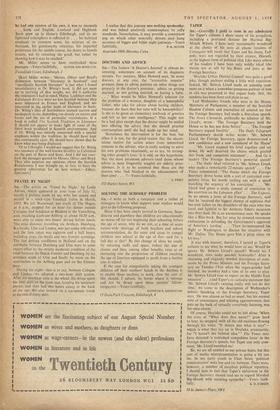DOCTORS AND ADVICE SIR,—The feature 'A Doctor's Journal' is always
in- teresting, sometimes on account of its dogmatic
myopia. For instance, Miles Howard says, 'In some doctors, at any rate, the "irresistible impulse" prompts them to advise patients on other things not properly in the doctor's province: advice on getting married, or not getting married, or having a baby. . . .' What would be Miles Howard's solution for the problem of a woman, daughter of a haemophilic father, who asks for advice about having children. because she fears that her sons will be Inemophilics? Is she to he given an elementary textbook of genetics and left to her own intelligence? This might not he a had plan except that the doctor might be misled into offering the advice that she should practise contraception until she had made up her mind.
'Sometimes the intervention is for the best, but Often it is not, for the gOod reason that the uncon- scious motive for action arises from unresolved tensions in the adviser, who is really seeking to solve his own problems vicariously, so to say, by arrang- ing other people's lives.' It is odd, on this hypothesis, that the most persistent advisers (and those whose advice is most frequently sought) arc elderly prac- titioners. Is it to be assumed that these are the doctors who 'feel blocked in the advancement of their aims' . . . ?—Yours faithfully,






























 Previous page
Previous page